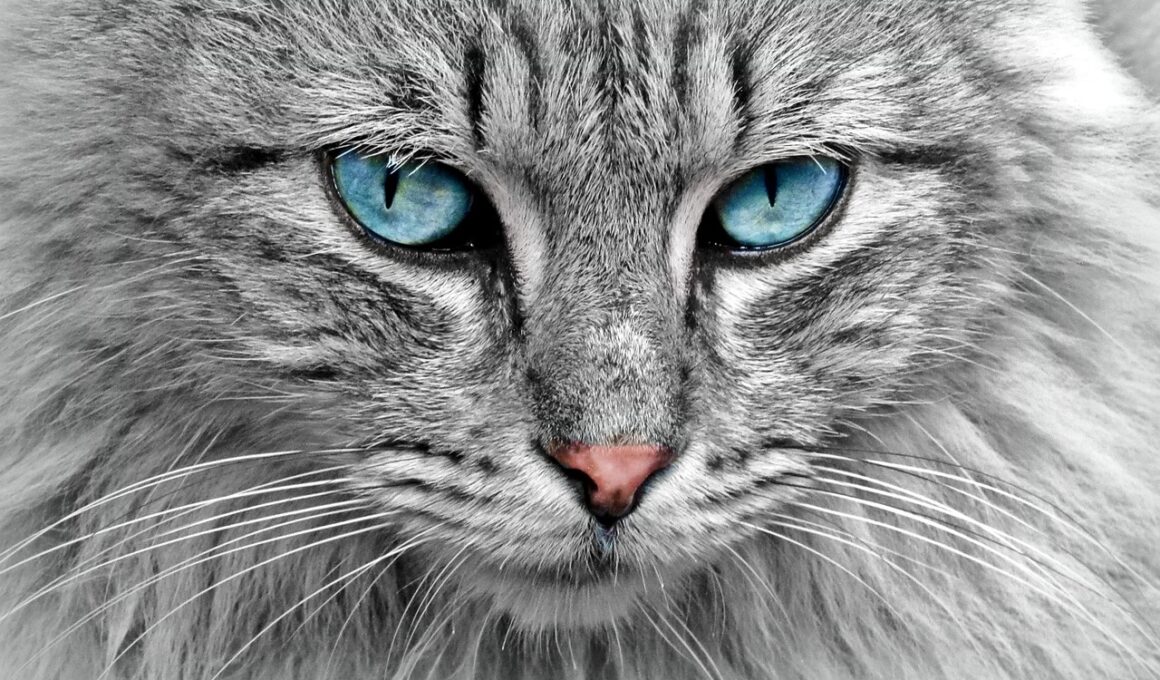Helping Older Cats Cope With Increased Noise Sensitivity
As cats age, they can develop new sensitivities, particularly towards loud noises. These sounds could be anything from construction work to fireworks, and they often cause significant distress and anxiety in older cats. Understanding your cat’s behavior and the reasons behind their fear is crucial. Older cats have less tolerance for sudden or sharp sounds due to physiological changes that affect their hearing and overall comfort. When exposed to loud noises, many will exhibit signs of stress, including hiding, excessive meowing, or even aggressive behavior. Providing a safe space where your cat can retreat when they feel overwhelmed is essential in helping them cope with these situations. Comfort zones should be quiet, dark, and familiar, ensuring your feline can feel secure. Additionally, maintaining a calm environment with muted background noise aids in minimizing their anxiety levels. Engaging your cat in relaxation techniques and creating positive associations with previously feared noises can greatly reduce their distress. Consider using calming sprays or supplements, but consult your vet first for tailored advice to your pet’s specific needs. Observing your cat’s body language is key to understanding their limits.
Creating a noiseless sanctuary for your older cat can make a huge difference in their well-being. Start by identifying spots in your home where the noise levels are significantly lower, such as your bedroom or a quiet bathroom. Make these spaces cozy and inviting with soft bedding and familiar toys. You can also play soft music on low volume or use white noise machines to help drown out sudden loud sounds from the outside. Gradually introducing your older cat to new sounds can be beneficial as well. For instance, if they show interest in a particular noise, you could record it at a softer volume and slowly increase it over time. This gradual exposure aims to desensitize them to the sound without causing anxiety. If your cat displays fear, allow them to take breaks, and never force them to confront their fears immediately. Positive reinforcement when they show signs of comfort with certain sounds encourages their openness. Banning loud activities around your cat’s safe zones can further provide a sense of security that empowers them to explore without fear. Patience and consistency are crucial during this process.
Recognizing Signs of Fear
Understanding the subtle signs of fear in older cats is vital for their emotional health. These signs may include hiding, excessive grooming, or vocalizing more than usual. Pay attention to their body language; a flattened ear position, an arched back, or a tucked tail can indicate distress. If you notice these behaviors, it is essential to respond with kindness and patience. Avoid scolding them, as this can amplify their fear. Instead, provide comfort by gently speaking to them in a soothing voice while allowing them to find their sanctuary. Regular observation of your cat can help you identify specific triggers that provoke their fear. Identifying what causes them to feel unsafe or anxious can create opportunities for intervention. Environmental changes, such as moving furniture or new pets, may also contribute to their stress. Use this information when training, ensuring you don’t expose them to these triggers until they feel secure. Building trust through consistent positive interactions will help establish a strong bond between you and your feline friend. Keeping a calm demeanor and addressing their fears gently encourages a more resilient and assured cat.
Sometimes, older cats may respond negatively even after you believe you have created a safe space. In such cases, consulting with a veterinarian can provide insights and recommendations tailored specifically to your cat’s condition. The vet may suggest behavioral modification tactics or even therapy options that align with your cat’s needs. Additionally, certain calming products available on the market, like pheromone diffusers or anxiety wraps, can be effective in alleviating stress. Understanding that some noise sensitivities can stem from prior traumatic experiences reinforces the necessity of a tranquil living space. Some cats may react to noises from fireworks or thunderstorms due to past distressing experiences. In such cases, providing a secure environment allows your cat to form positive associations over time. Be open to experimenting with various strategies, and adjust based on your observations. Remember, getting to know your older cat’s unique habits and behaviors is essential to finding effective solutions for their noise anxiety. Compassion and gradual desensitization are keys that can unlock their potential for facing the world with less fear.
Using Distractions
Distractions are an effective way to manage an older cat’s fear of loud noises. During a thunderstorm or when noisy activities occur nearby, distractions can redirect their focus. Engaging them in play sessions with their favorite toys, like feather wands or interactive puzzles, can create positive experiences amidst anxiety. Treats can also be useful; offering delicious options at the right moment can reinforce positive behavior. Food puzzles can keep their minds occupied and provide comfort during anxiety-inducing events, shifting their focus away from the noise. Additionally, creating a regular playtime routine helps establish structure, making your cat feel secure overall. Involving them in interactive play fosters a sense of confidence, reducing the likelihood of fear responses when faced with loud noises. Along with physical distractions, mental stimulation is key. Engaging them with training exercises, like clicker training, or teaching them new tricks can keep their minds off undesirable stimuli. The goal is to foster an environment filled with engaging activities, helping them feel more at ease with their surroundings while developing their adaptability to various situations.
Providing positive reinforcement through rewards is a wonderful practice to help your senior cat navigate their fears. Whenever they display calm behavior during a loud event, offer treats or praise as a reward. This strategy encourages them to associate the noise with positive experiences rather than as a source of anxiety. Consistency in timing is crucial; reward them immediately following a brave action, so they can connect the dots. Avoid waiting too long, as they may not link the noise to their response. Incorporating a gradual desensitization technique can also complement this practice, easing stress over time. Additionally, creating an area that minimizes noise distractions when working to reinforce calmness plays a significant role. Consider soundproofing a small room by using thick curtains and rugs, which absorb sound. Reducing outside distractions can create a more peaceful zone where your cat can feel secure. Over time, you’ll likely notice your cat becoming more comfortable during previously scary experiences. Remember, every cat is unique, and their journey towards overcoming noise sensitivity will take time, support, and understanding.
Conclusion
Ultimately, helping older cats cope with increased noise sensitivity involves a combination of environmental adjustments and emotional support. By creating a safe haven, employing positive reinforcement, and practicing gradual exposure to frightening sounds, you can aid your feline companion on their journey to overcome their fear. Familiarizing yourself with your cat’s body language and significant behaviors will strengthen your bond and cultivate trust. Remember to consult your veterinarian when in doubt, as their expertise can provide tailored solutions for specific problems. Patience is paramount; older cats may need extra time to adapt to changes in their surroundings and must not be rushed in the process. By supporting them in a compassionate and understanding way, you empower them to face challenges with reassurance. Observe how the techniques you implement help improve your cat’s overall quality of life. The process requires commitment, but witnessing your cat grow more confident in facing their fears will encourage a profound sense of fulfillment. Moreover, this progress will enhance the bond you share with your loyal feline friend.
Your older cat deserves your understanding and patience as they navigate noise sensitivity. Implementing these strategies will cultivate an environment of comfort and security that will improve their overall well-being. Consistent affection and attention can soften their journey into aging, ensuring their happiness remains a priority.


